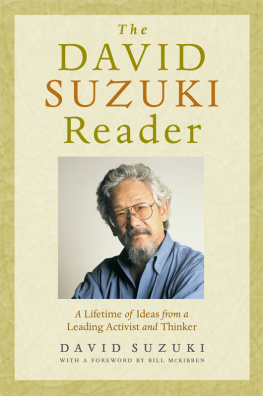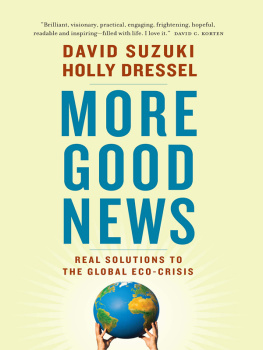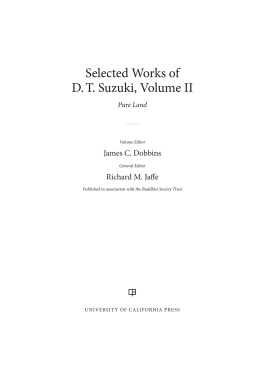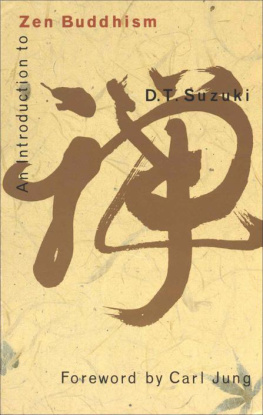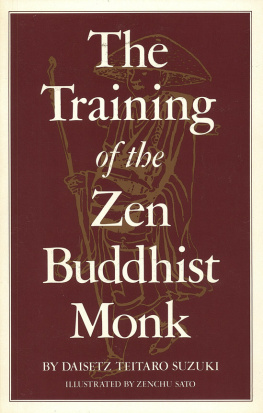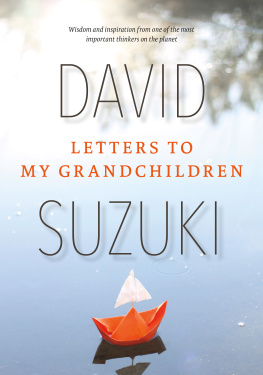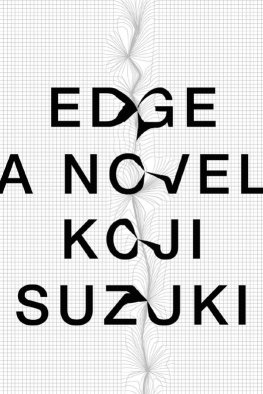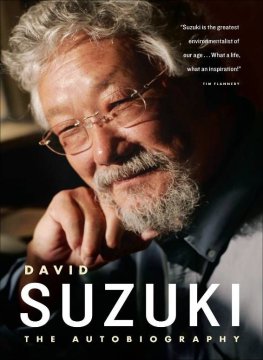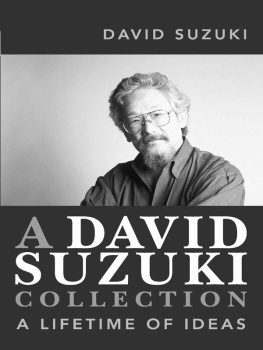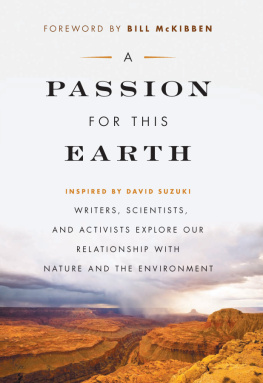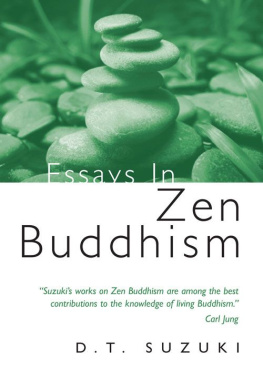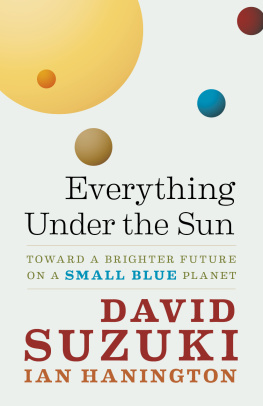
The
DAVID
SUZUKI
Reader
The
DAVID
SUZUKI
Reader
A Lifetime of Ideas from a
Leading Activist and Thinker
DAVID SUZUKI
FOREWORD BY BILL MCKIBBEN

Douglas & McIntyre Publishing Group
Vancouver/Toronto/Berkeley

Copyright 2003 by David Suzuki
03 04 05 06 07 5 4 3 2 1
U.S. edition copyright 2004
All rights reserved. No part of this book may be reproduced, stored in a retrieval system or transmitted, in any form or by any means, without the prior written consent of the publisher or a licence from The Canadian Copyright Licensing Agency (Access Copyright). For a copyright licence, visit www.accesscopyright.ca or call toll free to 1-800-893-5777.
Greystone Books
A division of Douglas & McIntyre Ltd.
2323 Quebec Street, Suite 201
Vancouver, British Columbia
Canada V5T 4S7
www.greystonebooks.com
David Suzuki Foundation
2211 West 4th Avenue, Suite 219
Vancouver, British Columbia
Canada V6K 4S2
National Library of Canada Cataloguing in Publication Data
Suzuki, David, 1936
The David Suzuki reader / David Suzuki.
Includes bibliographical references and index.
ISBN (paper) 978-1-55365-022-0
ISBN (ebook) 978-1-926685458
1. Human ecology. 2. Social ecology. 3. Environmental ethics. I. Title.
GF80.s84 2003 304.2 C2003-910906-2
Library of Congress information is available upon request.
Editing by Yvonne Van Ruskenveld and Nancy Flight
Cover design by Val Speidel
Cover photograph by Chick Rice
Printed and bound in Canada by Friesens
Distributed in the U.S. by Publishers Group West
Greystone Books is committed to reducing the consumption of old-growth forests in the books
it publishes. This book is one step towards that goal. It is printed on acid-free paper that is 100%
ancient-forest-free, and it has been processed chlorine-free.
We gratefully acknowledge the financial support of the Canada Council for the Arts, the British
Columbia Arts Council, and the Government of Canada through the Book Publishing Industry
Development Program (BPIDP) for our publishing activities.
Contents
by Bill McKibben
T HIS COLLECTION OF ESSAYS AND ARTICLES IS FULL OF INSIGHTS about the world. But read carefully, they are even more full of insights about the author, one of the continents most remarkable men. And most unlikely men.
Begin with the drama that shaped his early lifehis internment along with other Canadians of Japanese descent during the Second World War. Unjust, certainly, but it offered David Suzuki a pair of gifts. The most obvious was an introduction to the splendor of the natural world in the B.C. backcountry. Without a school to imprison him, the six-year-old Suzuki roamed the mountains that would in later days become Valhalla Provincial Park. Glory like that leaves its marknature in its wildest moods and most majestic expressions has been a touchstone for him since.
But the internment offered another gift, one that didnt develop until much later. He has spent his life open to the idea that power can be abusedany power, the power of a government or the power of a chainsaw or the power of a driftnet. That intuition rescued him from a life as a prominent scientistas a young biologist, Suzuki won every award there was to win and seemed set for a life at the lab bench. But he was a geneticist, and eventually it dawned on him that even the power of an idea could be abuseddawned on him that it was his genes that that had turned him into a prisoner before grade one.
And so he began his second life, as a communicator, the preeminent explainer of the natural world to television viewers around the planet. Before long, the CBC was peddling The Nature of Things in dozens of countries and Suzuki had emerged as a kind of Jacques Cousteau without a wetsuit. He was remarkably good in this rolein large measure, as this collection makes clear, because of his inordinate curiosity about everything that happened on the surface of the globe. Giant fungi, tiny fruit flies. Because he was a scientist, he knew how to make sense out of what he was seeing (and knew enough, too, to reject scientific certainties offered as explanation). He had that unteachable warmth that allowed audiences to identify with him, the only explanation for a television career that is numbered in decades.
But he was rescued from this second career toorescued from being nothing more than a talking head pointing at the cheetah as it consumes its kill. He emerged as Canadas nature authority at the precise moment that nature itself passed into its crisis, and he possessed too much sanity and too much backbone to ever pretend it wasnt happening. You might say he became radicalized, but in a deeper sense it was the world that turned radical, and he was simply honest enough to point it outthe clear-cut forests of Sarawak, the strip-mined deep seabed, the atmosphere filling with carbon dioxide till scientists now predict that the Earth will be 3 degrees warmer by centurys end. Easier by far not to notice this, of course, or at least not to pay it more than passing attentiondoubtless the CBC would have preferred someone a little less vigorous.
Even here, however, Suzuki pushed on. Most environmentalists content themselves with pointing out the practical folly of our treatment of the Earththat by tearing down the rain forest we will obliterate species that might someday treat our cancers, that by clogging the atmosphere with greenhouse gases we will cost ourselves large sums of money. All true, but also the easy way out.
Suzuki has committed himself to asking a deeper set of questions, reflected time and again in these essays. He questions the rationalism of the academy, even of his beloved University of British Columbia. He questions the very mediumtelevisionthat won him his audience. And, seditiously, he questions the global economic system that underwrites it all. Endless growth is impossible, he declaresa simple formulation that defies the basic current of our time. Global economics is perverted. He makes these points before a meeting of the World Bank and is greeted with a standing ovation but also a pointed question. Why dont you work with us? one bureaucrat asks. Its just a matter of getting the pricing right. Wrong, Suzuki insists. Important as markets are in offering a solution to our various woes, the most important things are beyond price. How much is your mother worth? Or your sister or your child?
Other factors have helped produce this unlikely man. Living on the fringe of the American empire was an obvious piece of luck, allowing him to see close up but clear-eyed the ways the world was being reshaped. Encountering the First Nations people of Canada at the moment that they began their renaissance helped him see nature with new eyes. Whatever the tributaries, though, they have merged into a mighty river of a man, as this book makes clear in a way that perhaps his more focused efforts cannot.
People often ask me, What is the most urgent environmental issue confronting us? he writes. I believe the overarching crisis resides in the modern, urban human mind, in the values and beliefs that are driving much of our destructiveness. That is not sentimental boshthats the considered opinion of a man who stands on firmer ground than most of us. In the essays that follow, diagnosis overlaps with prescription, description with passion, all of it filtered through a love so strong that it will not let us off easily. May they help make more of us into unlikely citizens of a needy planet. 
Next page
